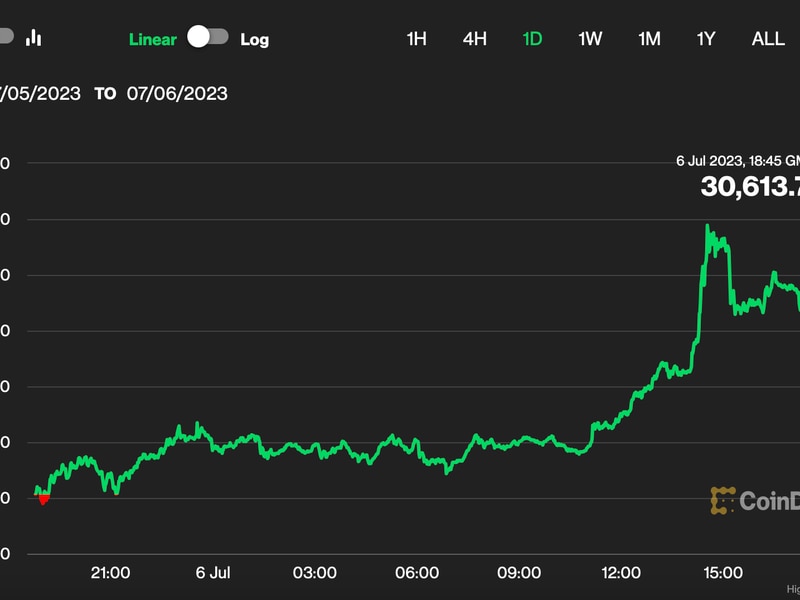Decentralized Wireless Project Helium Begins Move to Solana Blockchain
Join the most important conversation in crypto and Web3 taking place in Austin, Texas, April 26-28.
:format(jpg)/s3.amazonaws.com/arc-authors/coindesk/fa5ce9a3-9c4d-4ed4-bb04-c7af51bf1a0d.jpg)
Danny is CoinDesk’s Managing Editor for Data & Tokens. He owns BTC, ETH and SOL.
Join the most important conversation in crypto and Web3 taking place in Austin, Texas, April 26-28.
Crypto connectivity project Helium kicked off its migration to the Solana blockchain midday Tuesday, abandoning its own crypto infrastructure in favor of a new, more stable home.
Developers supporting the network have initiated a 24-hour process that will kick the Helium blockchain offline and recreate its key metrics on Solana. Helium’s smart contracts will be unusable during the transition, but if all goes according to plan the network will start back up again Wednesday.
The transition aims to make it faster and cheaper to operate on Helium, a project attempting to globally deploy decentralized wireless infrastructure that relies on cryptocurrency as an incentive mechanism. Until Tuesday its tokens lived for nearly four years on the Helium blockchain, a custom layer 1 that lacked the broad appeal of Solana, Ethereum and other smart contract platforms
Moving to Solana offers the project a wider audience and a more stable platform. Despite Solana’s own history of occasional outages, it is far more reliable and stable than Helium’s, according to Helium blog posts.
It will also give Helium a deeper pool of developers to call upon, as more developers are familiar with Solana blockchain’s coding language than Helium’s, according to Helium board member Arman Dezfuli-Arjomandi.
“You can no longer submit a transaction to the Helium blockchain,” Dezfuli-Arjomandi said in a livestream tracking the event around 12:10 Eastern time (16:10 UTC) Tuesday. The livestream had around 200 viewers.
The transition will see Helium’s tokens migrate to Solana and its hotspots – the hardware backbone behind Helium’s internet-of-things (IOT) network – switch from issuing HNT to IOT. However, token balances will be frozen during the transition period until Helium’s new infrastructure on Solana comes online.
Helium’s network of data-sharing hotspots will continue to operate during the 24 hour migration, according to a blog post.
Edited by Nick Baker.
DISCLOSURE
Please note that our
privacy policy,
terms of use,
cookies,
and
do not sell my personal information
has been updated
.
The leader in news and information on cryptocurrency, digital assets and the future of money, CoinDesk is a media outlet that strives for the highest journalistic standards and abides by a
strict set of editorial policies.
CoinDesk is an independent operating subsidiary of
Digital Currency Group,
which invests in
cryptocurrencies
and blockchain
startups.
As part of their compensation, certain CoinDesk employees, including editorial employees, may receive exposure to DCG equity in the form of
stock appreciation rights,
which vest over a multi-year period. CoinDesk journalists are not allowed to purchase stock outright in DCG
.
:format(jpg)/s3.amazonaws.com/arc-authors/coindesk/fa5ce9a3-9c4d-4ed4-bb04-c7af51bf1a0d.jpg)
Danny is CoinDesk’s Managing Editor for Data & Tokens. He owns BTC, ETH and SOL.
Learn more about Consensus 2023, CoinDesk’s longest-running and most influential event that brings together all sides of crypto, blockchain and Web3. Head to consensus.coindesk.com to register and buy your pass now.
:format(jpg)/s3.amazonaws.com/arc-authors/coindesk/fa5ce9a3-9c4d-4ed4-bb04-c7af51bf1a0d.jpg)
Danny is CoinDesk’s Managing Editor for Data & Tokens. He owns BTC, ETH and SOL.









